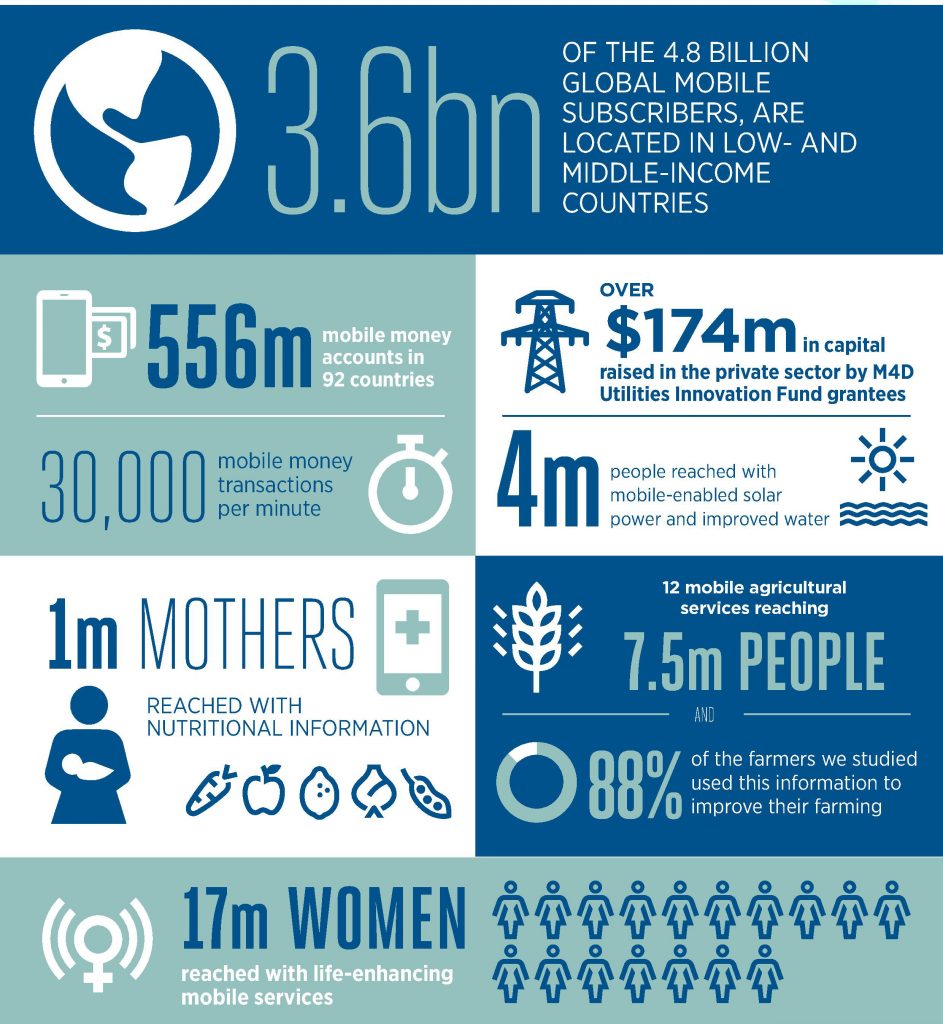My thesis is that mobile technology has become one of the most powerful platforms to reach the underserved. If you know me well, you have almost definitely already heard this view, because I make this point fairly regularly! But the facts back up my story. Of the 4.8 billion mobile subscribers globally, some 3.6 billion are located in low- and middle-income countries, making mobile unparalleled in its reach.
Mobile connectivity is easy to take for granted. Like power, water or transportation systems, many of us assume that these daily prerequisites will be available whenever we need them. But in low- and middle-income countries, connectivity is absolutely transformational when:
- A rural father can register the arrival of his newborn son using a mobile phone and ensure that his child gets access to the best healthcare available
- A mother uses a mobile-enabled solar lantern to keep her business open an extra hour and ensure that her daughter can continue her studies
- A young person can find work for the first time using his phone or an elderly person can access lifesaving help after an earthquake
The opportunity to transform lives through innovation is what motivates us in Mobile for Development. This promise drives our work across financial services, health, agriculture, digital identity, digital inclusion, energy, water, sanitation, disaster resilience and gender equality. And we are seeing strong results:
- Mobile money is being called one of the 50 innovations which make our modern economy. With 556 million accounts in 92 countries, the reach achieved in just one decade is unprecedented. While you read this, mobile money platforms are processing 30,000 transactions every minute. New products, like international money transfer, are demonstrating the ability of mobile money to continue the disruption cycle, with mobile money on average costing more than 50 per cent less than global money transfer operators.
- Mobile enabled energy solutions are increasingly operating at scale. An estimated 40,000 solar home systems are being installed every month, using mobile payments and machine-to-machine technology to provide reliable, clean energy to families and small businesses. And there is now something like £360 million of private sector capital invested in the last four years in mobile-enabled energy solutions, showing that this sector has commercial promise.
- The 12 agriculture services which GSMA Mobile for Development has been involved with have now reached 7.5 million people. 88% of the farmers that we studied have used this information to improve their approach to farming.
Almost none of these inventions would have been possible without a multi-stakeholder approach. Private sector, government and the development community have come together to bring these ideas from infancy to maturity. Nowhere is this more evident than energy, where 3 years ago the UK Department for International Development (DFID) invested £4 million into a portfolio of GSMA Mobile for Development grantees and these projects went on to unlock more than £40 million of follow-on funding. More examples of multi-stakeholder impact are 1 million mothers reached with nutrition information, 4 million people reached with solar power and improved water, 7.5 million farmers reached with services to improve crop yields and 17 million women reached with life-enhancing services.
In delivering life-enhancing solutions to people and communities across the world, the mobile industry is also committed to the achievement of the UN Sustainable Development Goals. Our latest data found that approximately 40% of people in emerging markets are now using their smartphones to look for work, to help improve and monitor the health of their family and to access information to support the education of their children. As an enabler for digital, financial and socioeconomic inclusion, mobile technology holds a great promise to deliver transformative impact for those who need it most.
We are thankful for the long time support that we have had from DFID, the Bill & Melinda Gates Foundation, Omidyar Network and the MasterCard Foundation. Today we are pleased to announce that we are increasing our collaboration with a number of key industry stakeholders, including USAID as an aligned partner of the Scaling Off Grid Energy Challenge, the UN Foundation on big data for social good, the UN Development Programme on our National Dialogues for Mobile Impact, the Swedish International Development Cooperation Agency (Sida) on digital inclusion, especially for women, and the SDGs, and The Norwegian Agency for Development Cooperation (Norad) on accelerating digital inclusion, especially digital literacy.


